
“Now we are engaged in a great civil war,
testing whether that nation, or any nation,
so conceived and so dedicated, can long endure.”
To be born an American, or to become an American, you need only know and understand four things that we have written down: 1. Our founding document, The Declaration of Independence. 2. Our agreement with ourselves and our government that specifies and protects the self-evident truths and freedoms of the Declaration, The Constitution. 3. Our national motto: “In God we trust.” 4. Our credo, “The Gettysburg Address.”
A credo is a short and straightforward statement of beliefs or principles. A credo has no fixed length but lies somewhere between a motto and a manifesto. The most widely known traditional credo would be “The Apostles Creed.”
Although it is not often thought of as such, Lincoln’s brief oration at Gettysburg at noon on that long-ago November day in 1863 is, in all its elements, our national credo. Although shaped as prose fit to be cut, as it has been, into stone, The Gettysburg Address is also a lyrical poem as polished as a crystal prism. Through this prism, all that we had been as Americans up until that day passed away and was transformed into the multifaceted nation Americans have become today. The Address is still not finished with us, nor we with it.
The Address shows us first how we came into existence as “the last best hope of Earth.” It echoes the opening refrain of the Declaration’s notes of liberty and equality. It reminds us of our original goals of “life, liberty, and the pursuit of happiness;” goals to which our founding fathers pledged their “lives, fortunes, and sacred honor.” It implies that all generations of Americans must, if the nation is to endure, pledge the same.
Four score and seven years ago
our fathers brought forth on this continent
a new nation, conceived in liberty,
and dedicated to the proposition
that all men are created equal.
The poem then brings the credo into the present. Not just the present moment of November 19, 1863, but all the present moments that came after right up to this very day in 157 years later in July of 2020. In 1863 the argument between Americans had become so pitched that civil war between the contending factions had torn the nation asunder. We have come close to similar passes since then several times, but have — remembering “the better angels of our nature” — always turned aside and found a way to move forward together as a great nation of an even greater people.
Now may be another such moment; another such turning. Lincoln could not know our moment, but in his credo, he indicates his belief that the test of his moment will be passed and that the nation will long endure. He also knows the cost of that test for those who “gave their lives that that nation might live.”
Now we are engaged in a great civil war,
testing whether that nation or any nation,
so conceived and so dedicated, can long endure.
We are met on a great battle-field of that war.
We have come to dedicate a portion of that field,
as a final resting place for those who here
gave their lives that that nation might live.
It is altogether fitting and proper
that we should do this.
From that moment in that long-ago November, Lincoln’s credo casts a cold eye on the ultimate costs of liberty whenever men determine that liberty, for themselves and their posterity, is worth whatever sacrifice is asked of them. Out of that vision, he tells us what the duty of all future generations of Americans must be.
In the closing of the Address, Lincoln is at once a President, a poet, a seer, and an American. As such, he closes the credo to which all future Americans must cleave. The credo requires us to be constantly renewing the work of liberty. The credo tells us that we — if we are to bear true faith and allegiance to all those who have built, stone by stone, poem by poem, word by word, and life by life, the city on the hill that is America — must always be dedicated to the unfinished work that is always before us. The credo requires that we “highly resolve” to leave our nation in a greater state of liberty than we found it. And to leave our Union entire and intact as “the last best hope of Earth.”
The most successful revolution in history was not the Russian Revolution or the Chinese Revolution. It was the American Revolution. It began more than two centuries ago and it continues to this day. It is not over yet. This is its credo.
But, in a larger sense, we can not dedicate,
we can not consecrate,
we can not hallow this ground.
The brave men, living and dead, who struggled here,
have consecrated it,
far above our poor power to add or detract.
The world will little note, nor long remember
what we say here, but it can never forget
what they did here.
It is for us the living, rather, to be dedicated
here to the unfinished work which they
who fought here have thus far so nobly advanced.
It is rather for us to be here dedicated
to the great task remaining before us—
that from these honored dead
we take increased devotion
to that cause for which they gave
the last full measure of devotion
—that we here highly resolve
that these dead shall not have died in vain
—that this nation, under God,
shall have a new birth of freedom
—and that government of the people,
by the people,
for the people,
shall not perish from the earth.

One of the two confirmed photos of Abraham Lincoln at Gettysburg, taken about noon, just after Lincoln arrived and some three hours before the speech. To Lincoln’s right is his bodyguard, Ward Hill Lamon.



![That Was the Whopper Weekend That Was [Illustrated] welcometohell](https://americandigest.org/wp/wp-content/uploads/2021/05/welcometohell-150x150.jpg)

![Allen Ginsberg: The Interview, <strong> ➡ 1972 ⬅ </strong> [Republished by unpopular demand] ginsbergnirvana](https://americandigest.org/wp/wp-content/uploads/2022/05/ginsbergnirvana-150x150.jpg)

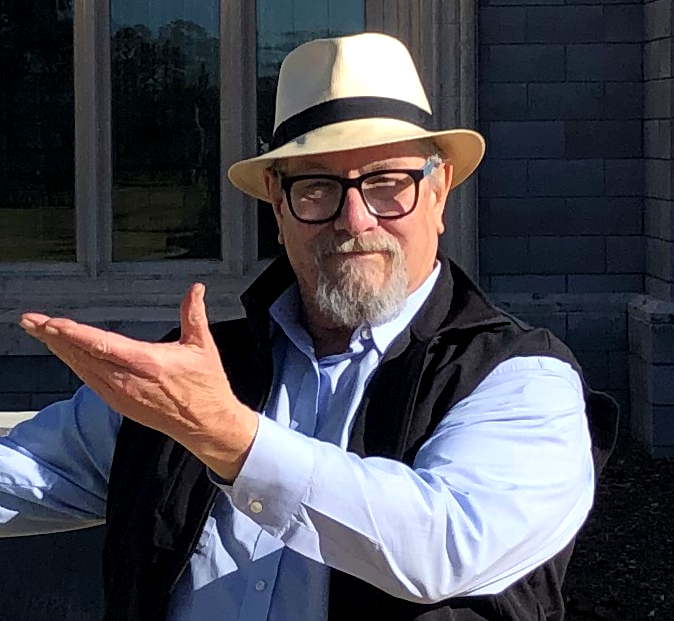 Gerard Van der Leun
Gerard Van der Leun



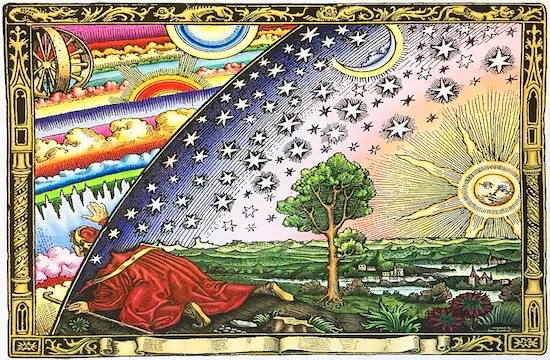




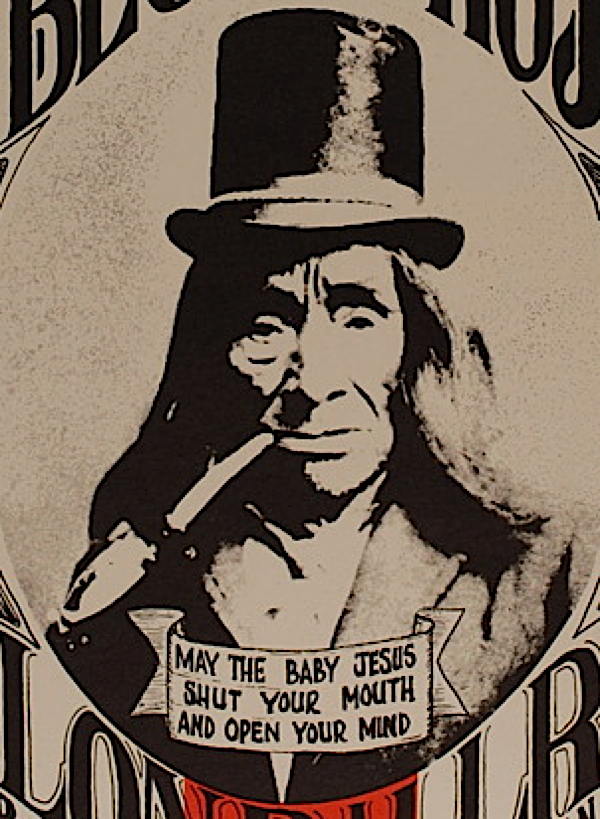

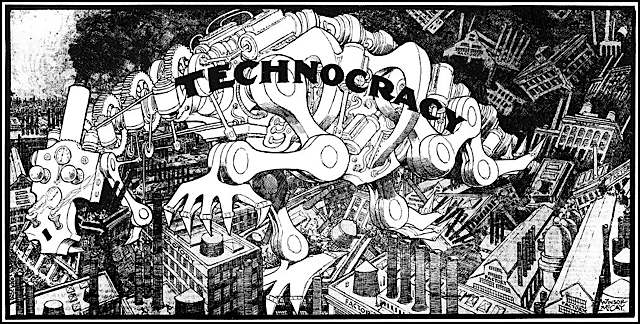










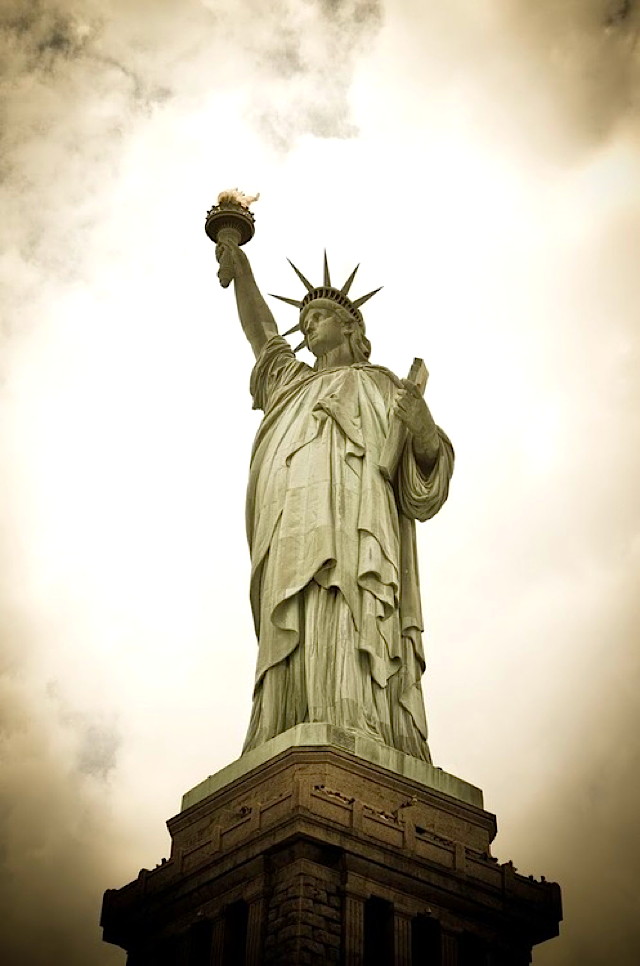


Comments on this entry are closed.
Gerard, this is simply a marvellous piece of thoughtful writing and commentary. Thank you—and Mr. Lincoln—for such inspiration for our 4th celebration and beyond. Words and principles to live by.
You are most welcome my valued Webutante. Glad to see you around.
Thank you, G. Will be back…you’re too good to miss.
It was not a civil war. In a civil war, you have two groups trying to control the government. We were not trying to control the yankee government.We had our own and it never surrendered, only The Confederate Army surrendered
Soldiers, on both sides of the War Between the States, marched into battle as sovereign citizens of their respective States. They marched home as subjects of the Federal Government.
Thanks Abe.
I memorized that speech when I was 8 years old. Almost 100 years exactly after it was delivered in the very place it was delivered. I was born in Gettysburg and lived the first 11 years of my life there. I lived everything Civil War and learned everything I could, visited the museums many times, walked the graveyards constantly, and hated the Rebels. I was a Yankee, I was right, Lincoln was my hero and I had read everything I could find on him.
Then I moved away, and I learned other things. After many, many years, and having learned many, many things, my Lincoln was not the person I was lied to about. He was not my Lincoln and in his own words, words that had been hidden from me for decades, he said it was not about slavery. I felt ashamed that I had fallen for such a shallow and transparent ploy. The shame gave way to anger.
As the years continued to pass the amount of lies continued to mount. Most of us enjoy the palatable versions of american history that have been specifically tailored for our appetites and their goals. You are meant to resist the truth, so embedded are their lies. You are programmed to resent the sentinels of truth.
John Wilkes Booth was four years too late.
Lincoln was a tyrant and deserved what he got in the end. The Gettysburg Address is drivel. And although much of what I read on your website is beautiful and thoughtful; you missed it(along with Bill O’reilly and Glen Beck) about Lincoln. He caused the death of 600,000+ Americans. He invaded sovereign states, burned and pillaged and looted. His henchmen (Sherman and Grant) were Americas first domestic terrorists.
Lincoln deserves to burn in hell (along with Frank the Cripple) for the war he directly and deliberately caused. If there is a just God then this is the case.
Over 600,000 dead, the South burned, countless women and children forced out of their homes, towns and cities, and for what?
To put the South under the North’s iron fist and bleed it dry ever since.
While we’re taking down statues of Confederate generals let’s also destroy that monstrosity called “The Lincoln Memorial” in the District of Corruption.
Now *THAT* would be something worth celebrating.
(and this is from someone who’s furthest trip South has been Phoenix…)
The written reasons states gave for their secession were based in their belief of right for expanding slavery into the western territories; no talk of inequities in allocation of funds from import tariffs.
Nowhere in the Constitution is secession from the Union forbidden. Lincoln behaved otherwise. Neither side, at the start, thought the war would be as long and as deadly as it turned out to be.
Lincoln believed that all had the rights to life, liberty, and the pursuit of happiness.
At least as late as 1858 he did not believe that full civil rights (voting, political office, racial intermarriage, …) also applied to ‘negroes’.
Let’s take a vote among all those killed, maimed, damaged, disenfranchised — weigh the votes according to intensity and duration of suffering, to determine whether the war was justified, considering it’s consequences until the year 2161.
Note to secessionists: you are right. But you are also responsible for bringing 600,000 Africans into a land with only three million citizens. Thanks for that. And then you lost the war. It was winnable, but no, you had your principles. The worst fate is a just cause badly defended.
The Constitutional Republic was effectively ended in 1865. I do not believe for a moment that Lincoln intended this but the use of brute force to make all states subservient to the central government could only result in the leviathan we see today. The social, economic and political consequences of that war are still emerging and are not in increase in equality, brotherhood or peace. And yes, I wish they had picked their own damned cotton.
Just ’cause’ – right to secede. This Right supported by 10th Amendment, and not otherwise excluded in the Constitution.
Unjustified and immoral ’cause’ – for slaveholder gain, to maintain and expand slavery.
Consequences?
For the vast majority, improvement in social, economic, political, equality domains. Brotherhood/peace domestically ? Still much improvement needed.
Overall grade, IMHO — B
There is nothing more asinine then applying modern (conspiratorialist) judgment to historical events. Yall ought to be ashamed. President Lincoln was a righteous men and the Gettysburg address are among the greatest words every composed in the English or any language.
Andy creates what he adolescently believes is a clever string of words to defend a proven tyrant indicating wholesale rejection of the vast amount of information available at his fingertips.
“Off with his nuts!”
Note to James Wilson: you are wrong. On one point.
Despite Dickens claim that slavery is a peculiar American institution,
it (the then modern variant) was introduced by the British.
Second point, on which you are correct – yes, the Confederacy was led by principled men acting on their honor.
Unlike their adversary. Lesson learned.
‘…the Confederacy was led by principled men acting on their honor.’
Strange honor placing states’ rights above human lives and rights.
james wilson,
Not true at all. Portuguese ships were the first to bring slaves to North America and they were quickly followed by the British, the French, the Spanish, the Dutch and finally New York ships. Southerners had little to nothing to do with the slave trade except for buying the slaves. Yes, southerners bought the slaves but the money mostly went to Europe and New York.
Happy Fourth of July, Gerard and All!
Although I agree with Walter Williams, that a case can be made that the Constitution should have permitted a State to exit, it’s a close call and I think that at times when the New England States may have threatened secession, statesman from the South opposed the idea.
Be that as it may, I think Lincoln and the GOP generally were right, that the secession of the South would have led to further splintering, recurrent wars such as the Europeans went on to have, and the extinguishment of the great hope that the profound and revolutionary words of the Declaration of Independence represent for us Americans and the entire world.
Perhaps Calvin Coolidge’s exposition in 1926 was not as eloquent as the Gettysburg Address, but it makes that important point very well.
As for the gravamen of the Secession, May I recommend “Apostles of Disunion” by Charles Dew?
There’also this great note from VS Naipaul’s talk ‘Our Universal Civilization’
This idea of the pursuit of happiness is at the heart of the attractiveness of the civilization to so many outside it or on its periphery. I find it marvelous to contemplate to what an extent, after two centuries, and after the terrible history of the earlier part of this century, the idea has come to a kind of fruition. It is an elastic idea; it fits all men. It implies a certain kind of society, a certain kind of awakened spirit. I don’t imagine my father’s Hindu parents would have been able to understand the idea. So much is contained in it: the idea of the individual, responsibility, choice, the life of the intellect, the idea of vocation and perfectibility and achievement. It is an immense human idea. It cannot be reduced to a fixed system. It cannot generate fanaticism. But it is known to exist, and because of that, other more rigid systems in the end blow away.
“It cannot generate fanaticism.”
And yet in 2022 USGov / GAE will destroy any given country by means unfair and foul if it doesn’t support the marriage of sodomites, Drag Queen Story Hour, the cuckoldry and dispossession of White men, the unquestioned right of Goldman Sachs to strip mine the national social capital, etc., etc… And of course the Tubman Distrito Federal (hat tip Severian) Regime does this to its captive, legacy, soon to be Soylent Green feed stock old growth White flyover peons as well.
Perhaps it didn’t generate Fanaticism (although Lincoln and Wilson and FDR *were* objectively raving slavering fanatics) but it sure as hell did nothing to protect you from being subjugated and ruled over by Fanatics.
Re VS Naipaul. The USA has had enough trouble from other Aliens telling you how to understand yourselves — Strauss / Jaffa and the Retconning Lincoln’s Gettysburg Address and the rest into a ‘Second Founding’ myth being one of the worst cases… My humble suggestion is not to pay any attention to head-wiggling curry munchers telling you who you are, too. Not a good track record. (Yes, I know his Caribbean Indian diaspora background and have read A Million Mutinies Now.. place of birth isn’t the issue… It’s he’s an ALIEN is the issue.)
I suppose the greatest form of freedom has just been examples by the breakaway republic of CHAZ. You can fully have that shit if you’d like it. Maybe hippy communes or Jonestown are reasonable examples; FIIK.
I was just discussing the English monarchy with my son this morning. he dislikes all things England with a passion and he’s an idealist. Probably got that from me. Monarchy is not the worst form of governance ever, but it is not the best by a long shot, for the USA. The revolutions leading up to the great vomiting off of monarchies that was World War One are spun from, I think, the fabric of all civilizations. People have rights, and they want and need things. Wars are the flexing, the spasms, of people wanting things for themselves, perhaps from one another, and of course wanting to preserve things from assault by others. Also, they result from raw passions and from fear. Also: jealousy. War is fukt up in the extreme, and it awaits you while you are trying to build a life for yourself. I hate war, but only as an observer. I have felt wars hot, alcohol breath at my neck, but it has not physically touched me. It did touch my dad, and that is not a small thing to me.
One basic tenet of war is that a potentate, and I include an American president like Lincoln, Roosevelt or Johnson (or Bush), will say to another nation, “Listen here you soddy fuck, here is the way it’s going to be…” and then he makes war on said fux. What are the reasons for such wars? Like I said earlier, someone wants.
Lincoln wanted to preserve the Union. Now, since, at least to my mind, Alexander divided up his empire, dividing nations is a sorry state of affairs. People want to divide my state, but I have lived a third of my life in each of a third of this verdant state. I am politically more like the part I’m in now, the east, but I have serious history in each part of Washington. Did the Southern states confederate and secede legally, or was Lincoln within the law to disallow that? I’m no lawyer, and FIIK. Did the denizens of CHAZ have any standing, morally, legally or any which way, to establish a free state?
There are certainly ways to find out. Durkin the Weak tried to allow wiggle to the secessionists. That was a fail unlike probably any failure of state ever witnessed in our time. The dog’s breakfast. Yes, the Confederacy was not the CHAZ, I know, but the substance of secession is a fair analogy at least.
Lincoln did what I think he had to do, and history has borne him out. Yaddafy all you like about sovereignty and state’s rights, but where does it stop? If I’m in a barroom, and a fight bursts out, I am not seeing anything but my friends, and dangerous people who are not my friends. I’m sorry, but violence works that way. I’m not a violent man, but I have seen enough of the world to know how shit happens.
I respect the South as a fighting force, and for their attempt to govern themselves by their own lights. But, that shit doesn’t work on my time. A nation has a lifeforce. It’s the one my grandfather and father, and to a lesser extent, myself, have invested in. We have seen it a certain way (my dad was a Roosevelt Democrat), and I’ll be goddamned if the Marxists will change anything on my watch.
Knowing that a disturbingly high percentage of the Vanderleuniate (much less the population of the genpop) would have me burned at the stake for my heterodox opinions, owing to my being a bad person, descended from untold generations of even worse people who have raised their fists against tyrants, from Edward Longshanks through Mad King George all the way to, as his fellow countrymen were wont to call him, “the original gorilla”, I must yet admit the power of the following bit of polemic, courtesy of the Sage of “Lagos on the Chesapeake”:
” The backwardness of the art of biography in These States is made shiningly visible by the fact that we have yet to see a first-rate life of either Lincoln or Whitman. Of Lincolniana, of course, there is no end, nor is there any end to the hospitality of those who collect it. Some time ago a publisher told me that there are four kinds of books that never, under any circumstances, lose money in the United States—first, detective stories; secondly, novels in which the heroine is forcibly debauched by the hero; thirdly, volumes on spiritualism, occultism and other such claptrap, and fourthly, books on Lincoln. But despite all the vast mass of Lincolniana and the constant discussion of old Abe in other ways, even so elemental a problem as that of his religious faith—surely an important matter in any competent biography—is yet but half solved. Here, for example, is the Rev. William E. Barton, grappling with it for more than four hundred large pages in “The Soul of Abraham Lincoln.” It is a lengthy inquiry—the rev. pastor, in truth, shows a good deal of the habitual garrulity of his order— but it is never tedious. On the contrary, it is curious and amusing, and I have read it with steady interest, including even the appendices. Unluckily, the author, like his predecessors, fails to finish the business before him. Was Lincoln a Christian? Did he believe in the Divinity of Christ? I am left in doubt. He was very polite about it, and very cautious, as befitted a politician in need of Christian votes, but how much genuine conviction was in that politeness? And if his occasional references to Christ were thus open to question, what of his rather vague avowals of belief in a personal God and in the immortality of the soul? Herndon and some of his other close friends always maintained that he was an atheist, but Dr. Barton argues that this atheism was simply disbelief in the idiotic Methodist and Baptist dogmas of his time—that nine Christian churches out of ten, if he were alive to-day, would admit him to their high privileges and prerogatives without anything worse than a few warning coughs. As for me, I still wonder.
The growth of the Lincoln legend is truly amazing. He becomes the American solar myth, the chief butt of American credulity and sentimentality. Washington, of late years, has been perceptibly humanized; every schoolboy now knows that he used to swear a good deal, and was a sharp trader, and had a quick eye for a pretty ankle. But meanwhile the varnishers and veneerers have been busily converting Abe into a plaster saint, thus making him fit for adoration in the chautauquas and Y. M. C. A.’s. All the popular pictures of him show him in his robes of state, and wearing an expression fit for a man about to be hanged. There is, so far as I know, not a single portrait of him showing him smiling—and yet he must have cackled a good deal, first and last: who ever heard of a storyteller who didn’t? Worse, there is an obvious effort to pump all his human weaknesses out of him, and so leave him a mere moral apparition, a sort of amalgam of John Wesley and the Holy Ghost. What could be more absurd? Lincoln, in point of fact, was a practical politician of long experience and high talents, and by no means cursed with inconvenient ideals. On the contrary, his career in the Illinois Legislature was that of a good organization man, and he was more than once denounced by reformers. Even his handling of the slavery question was that of a politician, not that of a fanatic. Nothing alarmed him more than the suspicion that he was an Abolitionist. Barton tells of an occasion when he actually fled town to avoid meeting the issue squarely. A genuine Abolitionist would have published the Emancipation Proclamation the day after the first battle of Bull Run. But Lincoln waited until the time was more favorable—until Lee had been hurled out of Pennsylvania, and, more important still, until the political currents were safely running his way. Always he was a wary fellow, both in his dealings with measures and in his dealings with men. He knew how to keep his mouth shut.
Nevertheless, it was his eloquence that probably brought him to his great estate. Like William Jennings Bryan, he was a dark horse made suddenly formidable by fortunate rhetoric. The Douglas debate launched him, and the Cooper Union speech got him the presidency. This talent for emotional utterance, this gift for making phrases that enchanted the plain people, was an accomplishment of late growth. His early speeches were mere empty fireworks—the childish rhodomontades of the era. But in middle life he purged his style of ornament and it became almost baldly simple— and it is for that simplicity that he is remembered to-day. The Gettysburg speech is at once the shortest and the most famous oration in American history. Put beside it, all the whoopings of the Websters, Sumners and Everetts seem gaudy and silly. It is eloquence brought to a pellucid and almost child-like perfection—the highest emotion reduced to one graceful and irresistible gesture. Nothing else precisely like it is to be found in the whole range of oratory. Lincoln himself never even remotely approached it. It is genuinely stupendous.
But let us not forget that it is oratory, not logic; beauty, not sense. Think of the argument in it! Put it into the cold words of everyday! The doctrine is simply this: that the Union soldiers who died at Gettysburg sacrificed their lives to the cause of self-determination — “that government of the people, by the people, for the people,” should not perish from the earth. It is difficult to imagine anything more untrue. The Union soldiers in that battle actually fought against self-determination; it was the Confederates who fought for the right of their people to govern themselves. What was the practical effect of the battle of Gettysburg? What else than the destruction of the old sovereignty of the States, i. e., of the people of the States? The Confederates went into battle an absolutely free people; they came out with their freedom subject to the supervision and vote of the rest of the country—and for nearly twenty years that vote was so effective that they enjoyed scarcely any freedom at all. Am I the first American to note the fundamental nonsensicality of the Gettysburg address? If so, I plead my aesthetic joy in it in amelioration of the sacrilege.”
A perusal of just where we are on Stanton’s stages of genocide might be instructive.
Three years of comments now. Mine here is sparked again by Ghost and his gradual conversion away from the narrative, through experience. Since the time I reached my twenties I had occasion to hear the same phrase, over decades, from different lips, each man a measured and modest fellow, spoken after yet another common version of Lincoln or the war or some such…..quietly refer to it all as the War of Northern Aggression, and that would be all. They spoke without rancor and without the expectation of anything better.
I began learning that lesson only twenty or so years ago. I remember them especially fondly now. What we are experiencing presently is the very same war, end game.
During Lincoln’s presidency in the summer of 1863 two significant, yet not war-winning Federal victories were won: Vicksburg and Gettysburg. Vicksburg did not gain the Federals their Anaconda Plan link to Federal-held New Orleans, and Gettysburg was a defensive win that only repelled the invader from a Union state (and prevented the Confederate advance on either Philadelphia or Washington).
Those two victories still left Lincoln’s prospects for reelection in doubt. It was only Sherman’s taking of Atlanta in 1864 that delivered to Lincoln’s campaign the boost, the shot in the arm, that it needed to cement his reelection.
This means that in the aftermath of Gettysburg Lincoln’s address there was primarily a political speech carefully crafted to appeal to northern voters, it was crafted to reassure the electorate that their sons’ sacrifices were and would continue to be worthwhile. It was only after the defeat of the Confederacy, indeed well after Lincoln’s death, that the Gettysburg Address gained notice and began to be regarded as a stirring paean to the republic and to (small “r”) republican virtue, and it has since been overlooked that it was a political speech given at a juncture of uncertainty for Lincoln’s reelection chances.
I think that it’s incumbent upon us to see his speech in the context of the moment at which Lincoln delivered it, and not as a template for republican virtue in our time when the republic has, owing to the deceits and chicanery of those who have their hands on raw power over us, ceased to resemble the political ideal that the speech’s rhetoric exalted.
What she said.
As a piece of English rhetoric, it is unparalleled.
Words matter. They can lead a nation down to perdition as well as any living man. And, outliving their author, they have all the time in the world to work their good or (more usually) evil.
Here’s some Lincoln you you might not have heard before.
https://www.lewrockwell.com/2017/08/thomas-dilorenzo/the-lincoln-myth/
You can search that author on that site for more in depth material.
Articles by Thomas DiLorenzo
https://www.lewrockwell.com/author/thomas-dilorenzo/
As mentioned here before I consumed everything Lincoln from an early age, and most other famous and lasting people. Washington, Jefferson, Jackson, etc., Henry Ford, Wright Bros., etc., Babe Ruth, Lou Gehrig, etc., virtually anybody that was anybody. From about age 8 up through my early 20’s. I was a ravenous reader.
When I encountered the words of Tom DiLorenzo at the new millennium I was knocked the fuk out. Dead on the floor. This guy single handedly pulled all the rugs out. Everything I thought I knew was laid bare as bald faced lies which made me question everything I had learned about everything else, and still. I became deeply cynical and to this day my default is everything is a lie until proven otherwise.
Underlining all of this is the question of why did hundreds of authors about Lincoln lie like they did, what was their gain? The truth was right there all along for those willing to dig below the surface as DiLorenzo proved. Why were all of us here told, by our teachers, and everybody else, the fantasy tale of the Lincoln that never was? It’s a mystery to me.
Captflee, your writing shows great learning and thought.
I agree there’s no evidence of Christian belief. Your own comments show Lincoln’s great oratorical skill. I suggest he learned it from assiduous study of the KJV version of scripture. There is a special language of scripture that has been used to get what you want out of people listening. Though I doubt he was Christian, I think Lincoln was filled with the spirit from Genesis through ecclesiastes, and so acquired powerful skills and deep understanding of the nature of humankind.
Part of that skill toying with human nature can be shown by the way Lincoln would tease the Radical Republicans that maybe he wouldn’t sign any 13th Amendment, abolishing slavery. It drove them to even more high pressure, intense efforts to get the thing done against all odds. God was kind and let Lincoln live until it was fullly signed and ratified. From his start I believe Lincoln intended a full, complete, perfect abolition of slavery in the U.S.
As for Lincoln’s faith. I think he shows the same faith in God as his namesake in the book of Genesis.
It sure looks to me like Lincoln dedicated himself to EX 21:16;
DT 23:15; 24:7 and JR 34:8,11 [a decree] “that every man should set free his male and female slave – a Hebrew man or woman – that no one should keep a Jewish brother in bondage.” Which goes universal when you apply LV 19:18.
psychodave;
While I thank you, those words are from the pen of H.L. Mencken.
I make no claims to any great original scholarship or unusually apposite thought upon the subject of Mr. Lincoln, having ever regarded him as just another politician, albeit more successful than most, and possessed of preternatural communication skills. Had most other pols been presented with those circumstances, independence for the South might well have come, assuming that a peaceful solution to the issue of slavery, which was the case in most of the world, barring us and that glorious beacon of peace and prosperity, the Republic of Haiti, not been arrived at. The Sainted Abraham himself was a supporter of the Corwin Amendment, the 13th Amendment prior to the one which passed, and which which would have made slavery permanent, but then again, a sharp pol, which “Honest Abe” certainly was, is quick to wet his finger and determine which way the winds of public opinion are blowing at a given moment, and likely to take the opposite tack should those winds shift ever so slightly.
8-BIT vs SHELLY – BRAWL STARS ANIMATION (SHOWDOWN)
Dear G:
If you would like to move my previous two posts to this conversation it will be fine with me.
Have a great 4th of July!
A part of the obligation of every American is to have the ability to be grateful.
I am grateful for you and this site Every Day–
And now, it seems, all words about all things are suspect by default and an honest man can tell outright almost everything is amiss. A quick scan down google news shows more lies than truth and it’s impossible to believe anything. The truth is found only after the lies have been revealed, if then. So for us of little patience we waste no time in the game of making history to your own liking. A pox on all their houses and my every hope is that all will get as they deserve in my lifetime. Start with the “potato”.
I’m no political scientist, that’s for certain. Do we divide, as the South tried to do, or not? To my eye, we are divided already. Look at a map that shows you the 2A sanctuary states and counties. There is a contiguous patch of the USA that defends the right to bear arms, and it is surrounded by the counties and states who do not defend that right. Don’t be fooled: that anti-American part still owns theyselves a fukton of firearms, and they mean to use them against you patriotic types.
WTF happened in Mass yesterday? While your nation’s military leadership are turning over every stone to find “white rage,” a militia of black separatists took over a section of interstate.
This morning, I see that bastion of whiteness, West Virginia, has rescinded sales taxes on ammo and firearms.
My comment from last year, upthread, is one of the best I’ve written on this esteemed site. I go against the sentiment that Lincoln was wrong, and against the idea of a contemporary secession. By some weirdness of contemporary event, we are functionally seceded right now. I’ll be damned, as my dad used to say…
Wait for them to bring the fight to you, is my advice. But be ready for the fight hungry for it.
Fight like Chamberlain on Little Round Top, or like Buford at the railroad cut. Fight with Pickett’s heart, and with the steel of an Audie Murphy (to jump wars).
Be ready to fight for the least insult, too. The enemy is already inside the wire.
ghostsniper
“A pox on all their houses and my every hope is that all will get as they deserve in my lifetime. Start with the “potato”.
Sooner, rather than later, would be lovely.
If you read Casey’s comment about the 2nd amendment, or have seen mention elsewhere, and have wondered, what’s it all about, why all the emphasis on that?
Read it and learn, think and then act.
Why Did it Have to Be Guns?
Over the past 30 years, I’ve been paid to write almost two million words, every one of which, sooner or later, came back to the issue of guns and gun-ownership. Naturally, I’ve thought about the issue a lot, and it has always determined the way I vote.
People accuse me of being a single-issue writer, a single- issue thinker, and a single- issue voter, but it isn’t true. What I’ve chosen, in a world where there’s never enough time and energy, is to focus on the one political issue which most clearly and unmistakably demonstrates what any politician — or political philosophy — is made of, right down to the creamy liquid center.
Make no mistake: all politicians — even those ostensibly on the side of guns and gun ownership — hate the issue and anyone, like me, who insists on bringing it up. They hate it because it’s an X-ray machine. It’s a Vulcan mind-meld. It’s the ultimate test to which any politician — or political philosophy — can be put.
If a politician isn’t perfectly comfortable with the idea of his average constituent, any man, woman, or responsible child, walking into a hardware store and paying cash — for any rifle, shotgun, handgun, machinegun, anything — without producing ID or signing one scrap of paper, he isn’t your friend no matter what he tells you.
If he isn’t genuinely enthusiastic about his average constituent stuffing that weapon into a purse or pocket or tucking it under a coat and walking home without asking anybody’s permission, he’s a four-flusher, no matter what he claims.
What his attitude — toward your ownership and use of weapons — conveys is his real attitude about you. And if he doesn’t trust you, then why in the name of John Moses Browning should you trust him?
If he doesn’t want you to have the means of defending your life, do you want him in a position to control it?
If he makes excuses about obeying a law he’s sworn to uphold and defend — the highest law of the land, the Bill of Rights — do you want to entrust him with anything?
If he ignores you, sneers at you, complains about you, or defames you, if he calls you names only he thinks are evil — like “Constitutionalist” — when you insist that he account for himself, hasn’t he betrayed his oath, isn’t he unfit to hold office, and doesn’t he really belong in jail?
Sure, these are all leading questions. They’re the questions that led me to the issue of guns and gun ownership as the clearest and most unmistakable demonstration of what any given politician — or political philosophy — is really made of.
He may lecture you about the dangerous weirdos out there who shouldn’t have a gun — but what does that have to do with you? Why in the name of John Moses Browning should you be made to suffer for the misdeeds of others? Didn’t you lay aside the infantile notion of group punishment when you left public school — or the military? Isn’t it an essentially European notion, anyway — Prussian, maybe — and certainly not what America was supposed to be all about?
And if there are dangerous weirdos out there, does it make sense to deprive you of the means of protecting yourself from them? Forget about those other people, those dangerous weirdos, this is about you, and it has been, all along.
Try it yourself: if a politician won’t trust you, why should you trust him? If he’s a man — and you’re not — what does his lack of trust tell you about his real attitude toward women? If “he” happens to be a woman, what makes her so perverse that she’s eager to render her fellow women helpless on the mean and seedy streets her policies helped create? Should you believe her when she says she wants to help you by imposing some infantile group health care program on you at the point of the kind of gun she doesn’t want you to have?
On the other hand — or the other party — should you believe anything politicians say who claim they stand for freedom, but drag their feet and make excuses about repealing limits on your right to own and carry weapons? What does this tell you about their real motives for ignoring voters and ramming through one infantile group trade agreement after another with other countries?
Makes voting simpler, doesn’t it? You don’t have to study every issue — health care, international trade — all you have to do is use this X-ray machine, this Vulcan mind-meld, to get beyond their empty words and find out how politicians really feel. About you. And that, of course, is why they hate it.
And that’s why I’m accused of being a single-issue writer, thinker, and voter.
But it isn’t true, is it?
https://lneilsmith.org/whyguns.html
ghost,
Your best yet!
Was going to reply/comment to Auntie and Casey as both had great things as well, but you absolutely NAILED it. There is no other ” issue ” to consider.
Vaya con Dios
Ghost; I know you come across as a non-believer however GOD bless you and Ghost for the win.
This was quite eerie to read. A fellow named Paul Fahrenheidt has penned a description of our next Civil War… likely to erupt around around 2028 or into the 2030’s. https://tinyurl.com/2kywh4sk
Good read Tom, thanks. Everyone here should read it. My take, as it has been all along, is similar to the commenter Martin Castillo under that article. Nothing much will change until the fuel that powers the federal engine is stifled. Money. Or debt, your choice. Much to my frustration I do not understand enough about how the entire financial system works to know why it works as it does. Why hasn’t it yet collapsed? How can an entity continue to descend into debt with seemingly no limit?
None the less, as long as that metric continues I don’t see anything major changing. Money seems to quell all things. When people have money everybody gets along but when the money vanishes the people turn into savages.
I think his timeline is too long, things will snap sooner.
Yes, Castillo’s comments are succinct in focus. It’s the money, the sheckels, the shiny beads that people believe are worth something that are rapidly losing credibility.
About four years ago the rupees of India, the 500 and 1,000 notes, were declared unusable after a surprise 48-hour period. There was a run on the banks to exchange these for smaller increments but chaos ensued and countless millions of people were thrown into poverty.
Greece pulled a really slick one when they emptied by half everybody’s bank accounts. I don’t know of a guarantee to avoid such a disaster because it appears the creature of Jekyll Island is lumbering uncontrollably towards an identical crime spree.
I get pretty nervous when there’s over 2K in my checking account so I’m continually draining it and stuffing the green confetti into a safe embedded in my concrete foundation. I’m buying gold and silver, and lately, just silver. This might be perhaps more shiny beads but that’s my only idea and I’m staying with it. Just bought some rain catchment barrels. And though we’ve had this debate before… I endorse Wolf Brand Chili.
Gotta link for the barrels?
Just had all new 6″ gutters and downspouts installed.
I’m buying whatever HOT chili that’s available.
Perfer the Hormel HOT version but I’m not picky.
My goto silver: jmbullion.com
It’s a local dude who has hundreds of barrels sitting on his acreage. The 60 gal. barrels are $100 each, come with a brass spigot, top screen and seal lid. I’ve no idea what he does for out of state but here’s his link. https://santaferainbarrels.com/ These things are large and I’d imagine wouldn’t there be someone selling the same thing near you?
For the metals I drive up to Colorado and purchase directly from Don Stott, 88 year old libertarian and he lets me sleep over in his victorian mansion. I’ve known this man many years. No tax, no reporting to unsavory alphabets. Just hardware for green confetti. JMBullion charges tax. Don’s got kids scattered around the countryside in the same business. His status says “retired” but he picks up the phone still. https://www.coloradogold.com/
That’s a good price for those barrels considering what’s included. Shipping costs would be murder, I’ll keep looking locally. I’ve bought a couple steel 55 gal drums at the Rural King but the interiors are such that I would not use for water reclamation. Plus, steel = rust. Just looked at my last several jmbullion receipts and no taxes of any kind, and free shipping if you buy over $200 which I always do. I’m only buying 90% silver US coins in dimes, quarters, halves and dollars. Easily identified, difficult to fake. I also have an assaying kit and have experimented with it. Maybe I’ll be a banker in the future! lol
I’ve never purchased from JMB but some friends of mine say they were charged tax for being out of state. Are these dudes located in Indiana? I don’t know. I’m just learning the rain catchment strategy. Plastic is superior. I’m collecting items to make my own fake Berkey system. Those go for over 3 or 4 hundred and a pal fabricated one for about $80. I will make a cup of coffee eventually and report back.
JMBullion.com 11700 Preston Road Suite 660153 Dallas, TX 75230
Rainwater “piracy” is on my front burner. All other areas of self sustainment are pretty much covered. But I lose sleep over not having permanent access to water. A well is very costly, more than $10k.
Couple years ago I put a double 5gal bucket system together that will put Berkey to shame, for less than $50. In fact I have 2 set ups, assembled from parts, tested, tore down and stored in boxes in the garage. A dozen spare filters too. I also have my small Sawyer rigs too.
What I really wish we had was an acre pond fed by 2 streams, and a solar powered pump. Again, more than $10k. prolly closer to $20k. I ain’t got a bill gates wallet.